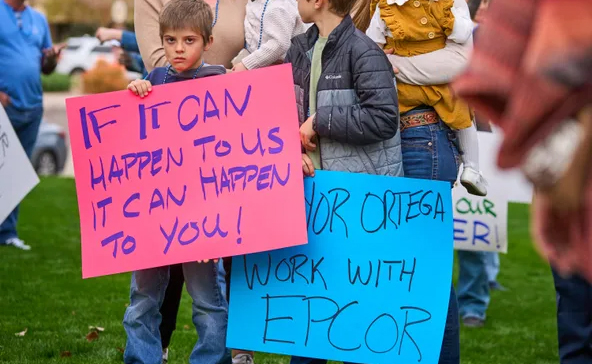By Sasha Hupka & Sam Kmack | Arizona Republic
 James Reim, 8, holds a sign as his family and other residents of the Rio Verde Foothills protest
James Reim, 8, holds a sign as his family and other residents of the Rio Verde Foothills protest
after Scottsdale cut off their access to water at the start of 2023. Alex Gould/The Republic
Dozens of Rio Verde Foothills residents filed a lawsuit Thursday meant to force Scottsdale into helping the community temporarily secure a water supply after the city cut off residents Jan. 1.
The lawsuit, along with a new bill in the state Legislature that would make the city liable for some costs incurred as a result of the shut-off, are the latest last-ditch attempts to pull back the community from disaster.
“The city of Scottsdale has placed plaintiffs and their families under an unconscionable amount of stress and anxiety by discontinuing their domestic water supply,” the lawsuit reads. “The lack of fresh potable water for families to be able to bathe themselves or running water to flush their toilets is a well-known basic necessity.”
They are also a sign of mounting pressure on Scottsdale over the community’s water woes. On Tuesday evening, about 60 Rio Verde Foothills residents gathered at the city’s Civic Center in an attempt to make officials hear their plea and come to the table. It came on the heels of a letter from state Rep. David Cook, R-Globe, who is also the primary sponsor of the new legislation targeting the city, House Bill 2411.
With no sign of a change of heart from Scottsdale leaders, Cook said it’s time to up the ante.
“I can’t wait and hope and pray that they’ll come to their senses,” he said. “I need to take action now and get these things moving, because if they don’t, these are the alternatives that they could be facing. And I’m going to fight hard.”
Rio Verde Foothills, a community that is near Scottsdale city limits but falls outside its boundaries as an unincorporated area of Maricopa County, has for years relied on Scottsdale to sell water to private haulers, who bring it to about 1,000 residents without working wells.
Since the shut-off, private haulers still can provide some water to the community through sources beyond Scottsdale. But those sources are unstable and can stop doing business with the haulers at any time. And the cost of water for residents has skyrocketed.
Potential solutions have been proposed, but none has come to fruition. Residents need two plans: a long-term solution and a short-term agreement to temporarily provide them with water as the permanent one is hashed out and shored up.
A proposal to create a water taxing district was defeated in August when the Maricopa County Board of Supervisors unanimously voted it down. Supervisor Tom Galvin, who represents the district encompassing Rio Verde Foothills, voted against the proposal after overseeing months of discussion and bickering between neighbors, citing concerns about the long-term viability of the district and its potential costs.
Instead, he favored a long-term agreement with private water utility EPCOR. That solution is currently in the works, but since the company is regulated by the state, the plan first must go through the Arizona Corporation Commission.
And interim plans hinge on Scottsdale Mayor David Ortega, who has repeatedly called himself a “hard no” on helping Rio Verde residents, saying that water isn’t “a compassion game.”
To back that up, he’s expressed concern over ongoing drought conditions on the Colorado River. He’s also opposed allowing any water serving Rio Verde Foothills residents to flow through the city’s water treatment plant and pipes, citing the impacts of water hauling trucks on Scottsdale roads and saying the city gave the county and Rio Verde Foothills residents ample notice that it wouldn’t provide water or infrastructure forever.
But the lawsuit contends that allowing water from EPCOR or other sources to flow to the community won’t cost Scottsdale any money ― and it could help avoid a humanitarian crisis. Some residents with at-home tanks were in danger of running dry as early as this week, the suit alleges.
Scottsdale officials declined to immediately comment on the lawsuit or Cook’s legislation. Ortega previously declined to comment on Tuesday’s protest.
Read more (subscriber content)
Some stories may only appear as partial reprints because of publisher restrictions.
